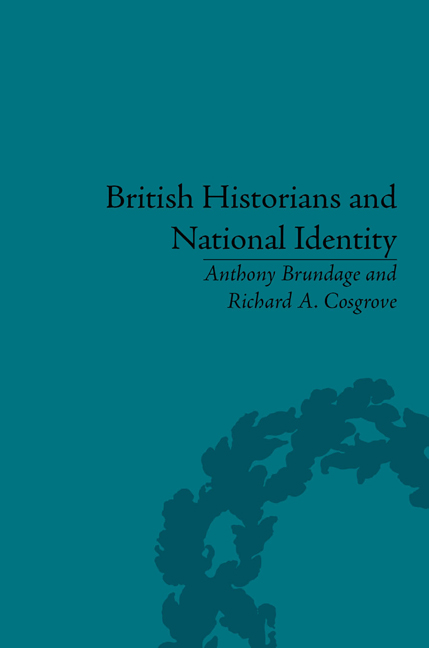Book contents
- Frontmatter
- CONTENTS
- Dedication
- Acknowledgements
- Introduction
- 1 Demythologizing the Nation's Past: David Hume's History of England
- 2 Catharine Macaulay's Vindication of Radicalism and the Republican Tradition
- 3 Reassessing Religion and the National Narrative: John Lingard and the English Reformation
- 4 Placing the Constitution at the Heart of National Identity: Henry Hallam and Constitutional History
- 5 Thomas Babington Macaulay: Writing the History of a Progressive People
- 6 The Glories of the Reformation and the Origins of Empire: J. A. Froude's Celebration of the Tudor Era
- 7 Edward Augustus Freeman: Liberal Democracy and National Identity
- 8 William Stubbs: The Continuity of English History as National Identity
- 9 Celebrating the People: J. R. Green's Short History
- 10 Samuel Rawson Gardiner: Incorporating Dissent into the National Story
- 11 In Thrall to English Tradition and Character: G. M. Trevelyan's Panoramic Histories of the Island Race
- 12 The Anglosphere as Global Model: Winston Churchill's History of the English-Speaking Peoples
- Conclusion
- Notes
- Works Cited
- Index
Conclusion
- Frontmatter
- CONTENTS
- Dedication
- Acknowledgements
- Introduction
- 1 Demythologizing the Nation's Past: David Hume's History of England
- 2 Catharine Macaulay's Vindication of Radicalism and the Republican Tradition
- 3 Reassessing Religion and the National Narrative: John Lingard and the English Reformation
- 4 Placing the Constitution at the Heart of National Identity: Henry Hallam and Constitutional History
- 5 Thomas Babington Macaulay: Writing the History of a Progressive People
- 6 The Glories of the Reformation and the Origins of Empire: J. A. Froude's Celebration of the Tudor Era
- 7 Edward Augustus Freeman: Liberal Democracy and National Identity
- 8 William Stubbs: The Continuity of English History as National Identity
- 9 Celebrating the People: J. R. Green's Short History
- 10 Samuel Rawson Gardiner: Incorporating Dissent into the National Story
- 11 In Thrall to English Tradition and Character: G. M. Trevelyan's Panoramic Histories of the Island Race
- 12 The Anglosphere as Global Model: Winston Churchill's History of the English-Speaking Peoples
- Conclusion
- Notes
- Works Cited
- Index
Summary
Patriotism and a country's national narrative go together, for no state and few citizens relish a comprehensive recitation of the nation's mistakes, atrocities and/or failures. The tenor of the story is inevitably a positive retelling of the historical record. People in general and historians in particular understand that historical circumstances do not last forever and change in every era confronts the individual. Our historians, particularly the Victorians, provided an idealized past because, in part, they pondered whether the glories of the English past would prove permanent. Familiar with the rise and fall of classical and medieval empires, for example, they recognized that the British Empire might decline and meet a similar fate. To contemplate the future caused a sense of ‘uncertainty and anxiety’ about what tomorrow might hold. As scholars grounded in the past, they understood that laws of human development, no matter how formulated, could not predict subsequent events in the same sense as the physical or life sciences. The free will of human beings meant that the lessons of history required careful definition and articulation.
Our thesis is that the national history passed from generation to generation, even as the story changes, constitutes an integral part of how the English people view themselves. This identification does not mandate any sort of fundamental agreement, for the past offers a variety of values with which to connect. History (and historians) provide the collective memory for the nation: ‘the archives of human experiences and of the thoughts of past generations’.
- Type
- Chapter
- Information
- British Historians and National IdentityFrom Hume to Churchill, pp. 195 - 198Publisher: Pickering & ChattoFirst published in: 2014



